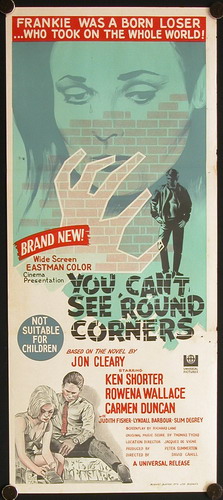
YOU CAN'T SEE ROUND CORNERS
Australia, 1967, 90 minutes, Colour.
Ken Shorter, Rowena Wallace, Carmen Duncan, Helen Morse.
Directed by David Cahill.
You Cant See Round Corners was a spin-off from a very successful Channel Seven Network televisions series in the late '60s. It was based on a '40s novel by Jon Cleary and updated to the Vietnam War period. The film preceded the Australian film renaissance and it one of the few features made in Australia during the '60s.
Ken Shorter is effective as the sullen hero. Rowena Wallace was at the beginning of her career as the heroine. A number of established actors and actresses like Carmen Duncan have central roles and up-and-coming stars like Henri Szeps can be seen in supporting roles.
The film reflects something of the attitude to Australians towards the army and towards Vietnam at the period - and the signs of protest against participation in the war.
1. An entertaining film of the 1960s? Issues? War in Australia? Vietnam? The period of the anti-hero?
2. The film as a feature-length spin-off from a TV series? The Australian television and film industry at the time? The television style? A frankness of the late '60s? The cast and their subsequent careers?
3. Jon Cleary and his work? Popular novels? Social issues?
4. Sydney in the '60s? Newtown and the suburbs, home, pubs, the streets? The trip to Manly? King's Cross? Wagga and the military camps? The dream sequence? Editing and pace? Musical score?
5. The film is a portrait of Frankie: the angry young man, the loner, the chip on his shoulder. an individualist, his relationship with his mother, his continually being irritated? Attitudes towards church and God - that the church had done no good for his father, refusing to go to Mass? His love for Margie? Her parents? Sex before marriage and waiting until marriage, quoting Father Maloney? At the pub, his friends? The gangs? The bashing and his pretending to be hurt? His anger at the call-up, at going to the army, the arrival, the army and the parade, issues of racial prejudice, Peter, Ken and the dance, the Sergeant- Major and his picking on him? The fight? The dance? Running away? His mother's attitude towards his return? Margie and the love, hostility? The owner of the hotel? Job, SP betting? Peggy and taking her to Manly? Stealing the money, going to King's Cross? The encounter with Myra, talking with her, sex, the gift?, The money? His returning and anxious about the notes? Searching? His nerviness with Myra'and killing her? Going back to Margie? The fight and his death? Blame, responsibility? Symbolic of the anti-hero of the times? The comment on the era?
6. The Mc Coys and their Catholicism, mother and her fidelity, Frankie’s talk about his father and God? Sense of duty? The mother's supporting her son while hurt? The end and the long walk from the funeral?
7. Margie as a nice suburban girl, not like the other girls, in love with Frankie, her family, her being late for Frankie's going, her reaction to his being AWOL, her parents and going to the pictures, the arguments, hurt and upset, the finale and the fight, the ending and his funeral?
8. The portrait of Myra as a King's Cross prostitute, the dancing, her relationship with men, encounter with Frankie and friendliness, taking him home, not wanting to be hurt? Saying goodbye to him, and not expecting him back? her dream of going to the snow? The money? His return, her resistance about the money, her death? The dreams and her haunting Frankie?
9. His work at the hotel, people at the bar, helping out, the SP booking, Peggy and her quips, resisting him, going to Manly? Help at the end?
10. The gangs in the inner city, their toughness, the people betting, money demands and timetables, brutality, bashings? Newtown? Informants?
11. The contrast with the army, the various types? The bigotry towards the Greeks? The North Shore types? The army as evening people out?
12. An entertaining story? A slice of life of the times?